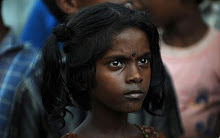
ஐ.நா வின் மனித உரிமை கவுன்சில் தீர்மானமும் இந்தியாவின் எதிர்ப்பும்... சமீபத்தில் ஜெனிவாவில் நடைப்பெற்ற ஐநா மனித உரிமை கவுன்சில் கூட்டத்தில் இந்தியாவில் இருக்கும் சாதி பாகுபாடு மற்றும் தீண்டாமை பழக்கங்களை மனித உரிமை மீறலாக அங்கீகரிக்க இருப்பதாக ஐநா மனித உரிமைக் கவுன்சில் அறிவித்த போது இந்தியா கடும் எதிர்ப்பு தெரிவித்தது. சாதி பிரச்சனைகளை சர்வதேச அளவில் கொண்டு செல்லக் கூடாது என்ற கோரிக்கையை இந்தியா வைத்தது. சாதி மற்றும் தீண்டாமை ஒழிப்புக்கு எப்படியெப்படி தீர்வுகாண வேண்டும் என்ற சில வரைவு கொள்கைகளையும் நான்கு மாதங்களுக்கு முன்பே ஐநா வெளியிட்டிருந்தது. சாதிப் பிரச்சனை அதிகமாக இருக்கும் நாடுகளில் ஒன்றான நேபாளம் ஐநா வரைவு கொள்கைகளுக்கு ஆதரவு தெரிவித்தது. செப்டம்பர் 16-ம் தேதி நடந்த கூட்டத்தில் நேபாள அமைச்சர் ஜீத் பகதூர் டார்ஜீ கௌதம் பேசுகையில், சாதி ஒழிப்பு தொடர்பான ஐநா மனித உரிமை அமைப்பின் ஆவணத்துக்கு முழு ஒத்துழைப்பு தருவோம். சாதிய பாகுபாடுகளுக்கு எதிரான அவர்களது ஆக்கப்பூர்வ முயற்சிகளுக்கு உதவுவோம் என்றார். ஆனால் இந்தியாவோ தங்கள் உள்நாட்டு விவகாரம் சர்வதேச அளவிற்கு கொண்டுச் செல்லத்தேவையில்லை என்று காட்டமாக சொல்கிறது. இதற்கிடையே, ஐ.நாவின் இந்த ஆவணம் குறித்து ஐரோப்பிய யூனியனின் வெளியிட்டுள்ள அறிக்கையில்... சாதி பாகுபாடுகளை களைவதே ஐரோப்பிய யூனியனின் முக்கிய குறிக்கோள். இந்த பிரச்சனை தொடர்ந்தால் மனித உரிமை கமிஷன் எதிர்காலத்தில் இதற்கு எதிராக வரைவு கொள்கையை தயாரித்து ஐநாவின் பொது சபையில் தாக்கல் செய்யும். அதன்மூலம் பெரிய அளவில் இப்பிரச்னைக்கு தீர்வு காண முடியும். என்று குறிப்பிட்டிருக்கிறது. ஐநா சபையின் எச்சரிக்கையும் ஐரோப்பிய யூனியனின் அறிக்கையும் இந்தியாவுக்கு இக்கட்டான சூழ்நிலையை ஏற்படுத்தி இருக்கின்றன. கடந்த 2001-ஆம் ஆண்டில் டர்பனில் நடந்த மனித உரிமைக் கவுன்சில் மாநாட்டின் போது இந்தியாவின் மீது இதே குற்றச்சாட்டு வைக்கப்பட்டது. சாதிபாகுபாடு மற்றும் தீண்டாமைக்கு எதிராக தீர்மானம் நிறைவேற்ற ஐநா மனித உரிமைக் கவுன்சில் முயன்ற போது தந்திரமாக இந்தியா தீர்மானத்தை நிறைவேற்ற விடாமல் அடக்கிவிட்டது. ஆனால் 2009-இல் ஐநா மனித உரிமைக் கவுன்சில் சாதி பாகுபாட்டை மனித உரிமை மீறலாக அங்கீகரித்து தீர்மானத்தை நிறைவேற்றினால் இந்தியாவின் ஐனநாயகம் கேள்விக்குரியாக்கப்படலாம். இதுவரையில் இந்தியா தன் நாட்டு மக்களின் சாதிவெறி மற்றும் தீண்டாமைக் கொடுமைகளுக்கு எதிராக என்ன செயல்பாட்டை முன்னெடுத்திருக்கிறது? சாதி ஒழியவேண்டும் என்று வாய்க்கிழிய பேசும் இந்திய தேசம் அதற்காக இதுவரை என்ன செய்திருக்கிறது? "பள்ளியில் படிக்க வரும் மாணவர்களிடம் சாதி என்னவென்று கேட்கப்படுகிறது..." "இன்னும் ஊருக்கு வெளியே சேரிகளில் தாழ்த்தப்பட்டவர்கள் வாழ்கிறார்கள்..." "இன்னமும் கோயில் கருவறைக்குள் நுழைய பார்ப்பனர் சாதியைத் தவீர வேறு சாதியினர் யாருக்கும் உரிமை இல்லை. சில சாதியினருக்கு கோயில் உள்ளேயே வர அனுமதியில்லை..." இதோ மிக சமீபத்தில் நடந்த ஓர் சம்பவம்.... தமிழகத்தில் விழுப்புரம் மாவட்டம் திருக்கோவிலூர் வட்டத்தைச் சேர்ந்த காங்கியனூர் கிராமத்தில் இருக்கும் கோவிலுக்குள் நீண்ட காலமாக தலீத் மக்கள் அனுமதிக்கப்படுவதில்லை. தாங்கள் கோவிலுக்குள் சென்று கடவுளை வழிபட அனுமதிக்க வேண்டும் என்று மாவட்ட நிர்வாகத்தினரிடம் பலமுறை கோரிக்கைகள் வைத்தும் எந்த பலனும் இல்லாததால் செப்டம்பர் 30.09.09-இல் கோயில் நுழைவுப் போராட்டத்தில் ஈடுபட முயன்றபோது போலீசாரால் தாக்கப்பட்டு 105-தலீத் மக்களை சிறையில் அடைத்துள்ளது இந்திய ஜனநாயகம். இன்னமும் அவர்கள் விடுவிக்கப்படவில்லை. இப்படி இந்தியா முழுவதும் ஏராளமாக மனிதஉரிமை மீறல்கள் நடக்கிறது. சுதந்திரம் அடைந்த நாட்டில் இன்னமும் மனிதனை மனிதன் இழிவுபடுத்துவதும், தலீத் மக்களுக்குள் உரிமைகள் எதுமற்ற நிராயுதபாணிகளாக வைத்திருப்பதும் எந்த விதத்தில் சமத்துவத்துவமாகும்?






